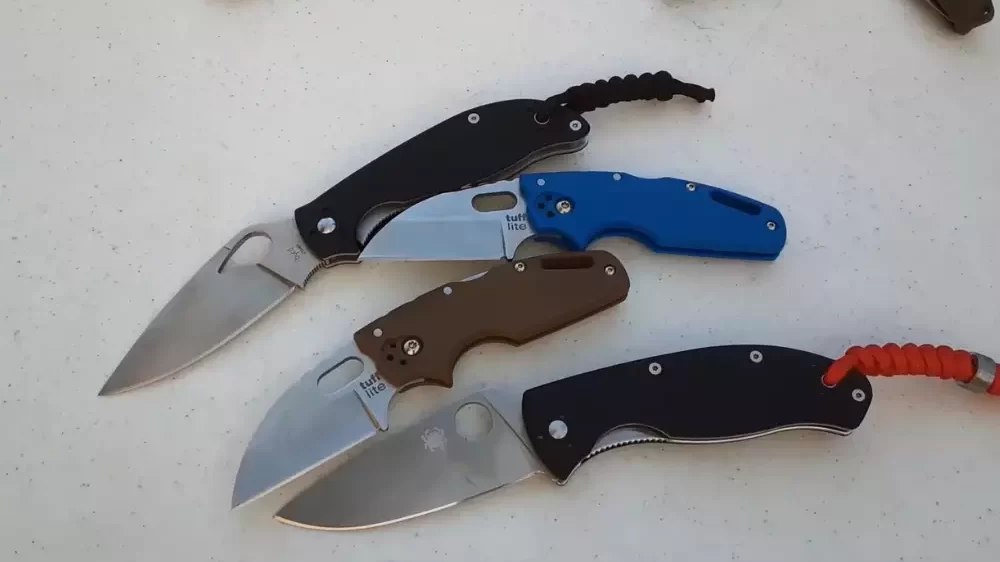When it comes to choosing the right steel for your next knife or tool, the decision can be daunting. With numerous options available, understanding the differences between them is crucial.
Today, we’ll focus on two popular steels: 440C and D2. Both are known for their unique properties, but how do they measure up against each other?
Let’s delve deeper into the world of steel and discover the advantages and disadvantages of each type, as well as how to choose the perfect one for your needs.
What are 440C and D2 Steels?
The world of steel is vast and complex, with countless grades to choose from. These two steels are popular choices for knives and cutting tools, each with distinct properties that make them suitable for specific applications.
440C Stainless Steel: Properties and Applications
Chemical Composition
440C is a high-carbon martensitic stainless steel, known for its high strength, hardness, and wear resistance.
It contains around 0.95%-1.20% carbon and 16%-18% chromium, along with small amounts of manganese, silicon, and molybdenum.
Due to its high carbon content, 440C can achieve hardness levels of 58-60 HRC (Rockwell C scale) when properly heat-treated.
Advantages of 440C
- High hardness and wear resistance
- Good corrosion resistance
- Retains a sharp cutting edge
Disadvantages of 440C
- Relatively difficult to sharpen
- Less tough than other steels, making it more prone to chipping and breaking under extreme use
Common Applications
- High-end knives
- Surgical instruments
- Ball bearings

D2 Tool Steel: Properties and Applications
Chemical Composition
D2 is a high-carbon, high-chromium tool steel that falls into the category of air-hardening, cold work steels.
It contains approximately 1.4%-1.6% carbon and 11%-13% chromium, as well as small amounts of vanadium, molybdenum, and other elements. These alloying elements contribute to its high wear resistance, toughness, and moderate corrosion resistance.
D2 steel can achieve a hardness of 59-62 HRC after proper heat treatment. It is commonly used in applications where wear resistance and edge retention are important.
Advantages of D2
- High wear resistance and edge retention
- Good toughness
- Moderate corrosion resistance
Disadvantages of D2
- Lower corrosion resistance compared to 440C
- Can be challenging to sharpen
Common Applications
- Cutting tools
- Dies and molds
- Gears and bearings

Comparing 440C and D2: Key Factors
Corrosion Resistance
Corrosion resistance, or Rust resistance, is an essential factor when considering the durability of a blade. 440C stainless steel has a higher chromium content (16-18%) compared to D2 tool steel (11-13%), resulting in better rust resistance.
This makes 440C a better choice for applications where the steel will be exposed to moisture or corrosive environments.
Wear Resistance
D2 tool steel is known for its exceptional wear resistance, outperforming 440C stainless steel in this aspect.
The high carbon and chromium content in D2 provides a more wear-resistant surface, making it a popular choice for cutting tools and other applications where edge retention and durability are crucial.
Edge Retention
Edge retention refers to a blade’s ability to maintain its sharpness after continuous use. Both 440C and D2 steels have good edge retention due to their high carbon content.
However, D2 is generally considered to have better edge retention than 440C due to its higher chromium and vanadium content, which improves wear resistance.
Hardness
Both 440C stainless steel and D2 tool steel have high hardness levels, which contribute to their excellent edge retention and wear resistance.
However, D2 steel generally has a slightly higher hardness level than 440C due to its higher carbon content.
Ductility
Ductility refers to a material’s ability to deform without breaking or cracking. Both 440C stainless steel and D2 tool steel have relatively low ductility due to their high hardness levels.
However, D2 steel is generally considered to have slightly better ductility than 440C.
Toughness
Toughness is the ability of a material to resist breakage, chipping, or cracking under impact. Although both steels have relatively high hardness, D2 tool steel is generally considered to have better toughness than 440C stainless steel.
This means that D2 is more resistant to chipping and breaking, making it a suitable choice for applications where impact resistance is important.
Ease of Sharpening
Both 440C and D2 steels can be challenging to sharpen due to their high hardness. However, 440C stainless steel is generally easier to sharpen compared to D2 tool steel. If ease of sharpening is a priority, 440C may be a more suitable choice.
Strength
Strength refers to the material’s ability to resist deformation under load. D2 tool steel typically has a higher strength than 440C stainless steel due to its higher carbon and chromium content.
Composition
440C stainless steel has a composition of 0.95-1.20% carbon, 16-18% chromium, and 0.75% molybdenum.
D2 tool steel has a composition of 1.4-1.6% carbon, 11-13% chromium, 0.3% nickel, 0.7-1.2% molybdenum, and 0.8-1.2% vanadium.
The differences in composition result in varying properties, such as rust resistance, wear resistance, and toughness.
Comparison Table: 440C vs D2
| Property | 440C Stainless Steel | D2 Tool Steel |
| Edge Retention | Good | Better |
| Rust Resistance | Better | Good |
| Hardness | High | Slightly Higher |
| Toughness | Lower | Higher |
| Ductility | Lower | Slightly Higher |
| Sharpness | Easier to Sharpen | More Challenging |
| Strength | High | Higher |
| Composition | 0.95-1.20% C, 16-18% Cr, 0.75% Mo | 1.4-1.6% C, 11-13% Cr, 0.3% Ni, 0.7-1.2% Mo, 0.8-1.2% V |
Selecting the Right Steel for Your Needs
When deciding between 440C stainless steel and D2 tool steel, consider the specific requirements of your application.
If corrosion resistance is a top priority, 440C stainless steel is the better choice. On the other hand, if wear resistance and toughness are more important, D2 tool steel is the way to go.
Heat Treatment: Maximizing Performance
Proper heat treatment is crucial in achieving the optimal performance of both 440C stainless steel and D2 tool steel.
Each steel grade requires a specific heat treatment process to maximize its potential properties. Consult with an experienced heat treatment specialist to ensure the best results for your chosen steel.
Maintenance and Care Tips
Proper maintenance is essential in prolonging the life of your tools or knives made from 440C stainless steel or D2 tool steel.
Regular cleaning, oiling, and sharpening will help maintain their performance and prevent rust and corrosion.
FAQs
Can I use 440C stainless steel for outdoor applications?
Yes, 440C stainless steel is suitable for outdoor applications due to its high corrosion resistance. However, it is still essential to maintain and clean the steel regularly to prevent rust and corrosion.
Is D2 tool steel a good choice for kitchen knives?
While D2 tool steel has excellent wear resistance and edge retention, its lower corrosion resistance may make it less suitable for kitchen knives, especially if they are exposed to moisture and acidic substances.
Which steel is more expensive, 440C or D2?
The prices of steel grades can vary depending on the supplier and market conditions.
However, D2 tool steel is generally considered more expensive than 440C stainless steel due to its superior wear resistance and toughness.
Final Verdict
Both 440C stainless steel and D2 tool steel have unique properties that make them suitable for various applications.
440C stainless steel is known for its excellent corrosion resistance, making it ideal for environments prone to rust and corrosion.
On the other hand, D2 tool steel offers exceptional wear resistance and toughness, making it perfect for cutting tools and heavy-duty applications.
Ultimately, the choice between these two steels comes down to the specific needs of your project, ensuring the right balance of performance, durability, and corrosion resistance.
